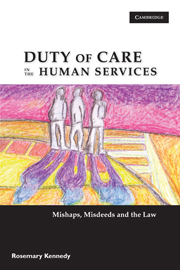Book contents
- Frontmatter
- Dedication
- Contents
- Acknowledgements
- Author's note
- Part 1 Positioning and mapping the territory of human service mishaps and misdeeds
- Part 2 Mishaps and misdeeds through a law lens
- Part 3 Mishaps and misdeeds through a human services lens
- Chapter 9 Service delivery – screening, assessment and planning
- Chapter 10 Service delivery – implementation and closure
- Chapter 11 Information and records management
- Chapter 12 Relationships, rifts and reactions
- Part 4 Mishaps and misdeeds through a unified lens
- Appendix: Finding the law and cases
- References
- Index
Chapter 11 - Information and records management
from Part 3 - Mishaps and misdeeds through a human services lens
Published online by Cambridge University Press: 05 June 2012
- Frontmatter
- Dedication
- Contents
- Acknowledgements
- Author's note
- Part 1 Positioning and mapping the territory of human service mishaps and misdeeds
- Part 2 Mishaps and misdeeds through a law lens
- Part 3 Mishaps and misdeeds through a human services lens
- Chapter 9 Service delivery – screening, assessment and planning
- Chapter 10 Service delivery – implementation and closure
- Chapter 11 Information and records management
- Chapter 12 Relationships, rifts and reactions
- Part 4 Mishaps and misdeeds through a unified lens
- Appendix: Finding the law and cases
- References
- Index
Summary
IN SCREENING, ASSESSING, implementing and monitoring planned interventions and in all other functions, human service workers manage information. They seek, acquire, sort, interpret, record and discard material. Electronic or paper records – case notes, files, reports, minutes, memos, emails, forms and letters, to name a few – are basic tools and core requirements of all human services practice. Workers repeatedly make conscious or unconscious decisions about what is important, about what is to be recorded, when, how and why, and about who will have access to information. The centrality of good-quality and purposeful information and information management practices in the human services is recognised in organisational codes (eg Department of Health 2006), promulgations of professional associations (eg Australian Association of Social Workers 2002, Code of Ethics 4.2.5 and 4.2.6; Australian Association of Social Workers 2003, Standards 1.6 and 1.7; Australian Psychological Society Ltd 2004b) and the professional literature, and emphasised in various inquiries into human services failures (eg Crime and Misconduct Commission 2004).
Multiple, sometimes conflicting, legislative requirements covered in previous chapters, to either divulge information or keep it secret are the tip of the information management iceberg and act in tension with a common preoccupation about confidentiality in the human services. Information and records management involves more than non-disclosure or confidentiality, and confidentiality, despite some human services beliefs to the contrary, is never absolute.
- Type
- Chapter
- Information
- Duty of Care in the Human ServicesMishaps, Misdeeds and the Law, pp. 208 - 233Publisher: Cambridge University PressPrint publication year: 2009



